If you’ve ever scrambled to fix a late delivery, argued over unclear payment terms, or dealt with the fallout of a supplier failing to deliver, you’re not alone.
For many businesses, especially in B2B and logistics-heavy industries, supplier issues can derail entire operations. And more often than not, the problem starts with a vague, outdated, or non-existent supplier contract.
A good supplier contract isn’t just legal paperwork. It’s your safety net. It’s what protects your timelines, your margins, and your reputation.
In this article, we’ll break down what makes a solid supplier contract, what to include, common mistakes to avoid, and how to create agreements that actually work in real life.
What Is a Supplier Contract?
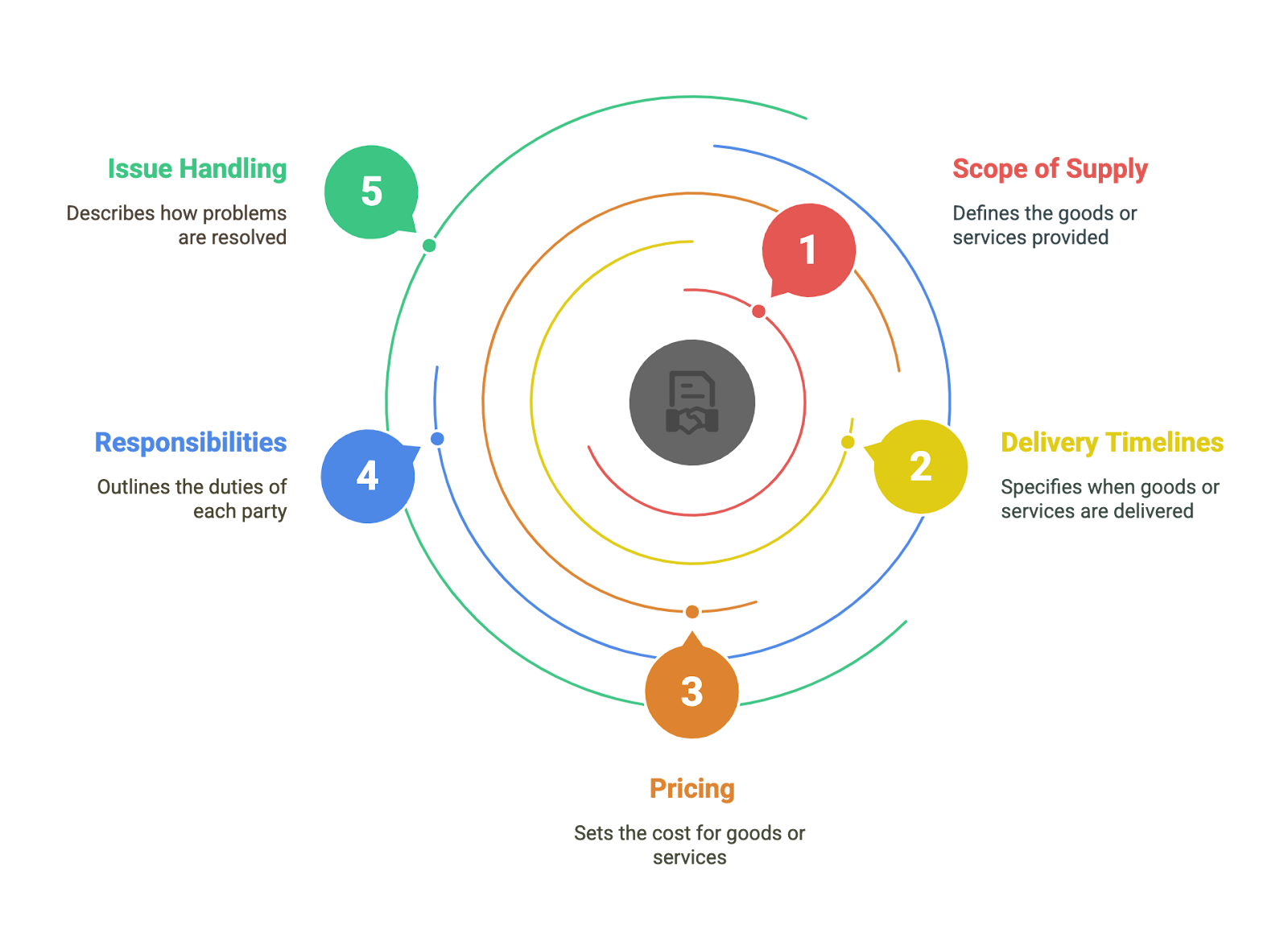
A supplier contract is a formal agreement between a company and an external party that provides goods or services. It defines the scope of supply, delivery timelines, pricing, and the responsibilities of each party, including how issues such as delays or defects will be handled.
In essence, it sets the ground rules for a successful supplier relationship. A well-drafted supplier contract brings clarity, accountability, and structure to the partnership. Conversely, a poorly written or missing contract can lead to misunderstandings, operational disruptions, and significant financial losses.
Why Supplier Contracts Are So Important
In industries such as manufacturing, retail, and logistics, supply chain reliability is critical. Disruptions can be costly but many are avoidable with the right contractual safeguards in place. A well-structured supplier agreement helps organizations to:
- Secure consistent pricing and delivery schedules
- Define clear quality and performance standards
- Establish expectations for both parties
- Prevent disputes through predefined processes and responsibilities
How Supplier Contracts Differ from Other Agreements
It is important to distinguish supplier contracts from similar business documents:
- Purchase orders are typically used for one-off transactions and are often less detailed.
- Service contracts apply to engagements such as consulting, software support, or design services.
- Supplier contracts, by contrast, are more strategic in nature. They usually govern long-term supply arrangements and cover a broader range of terms, including logistics, quality control, compliance, and risk allocation.
Legal Foundations and Types of Supplier Contracts
What the Law Says
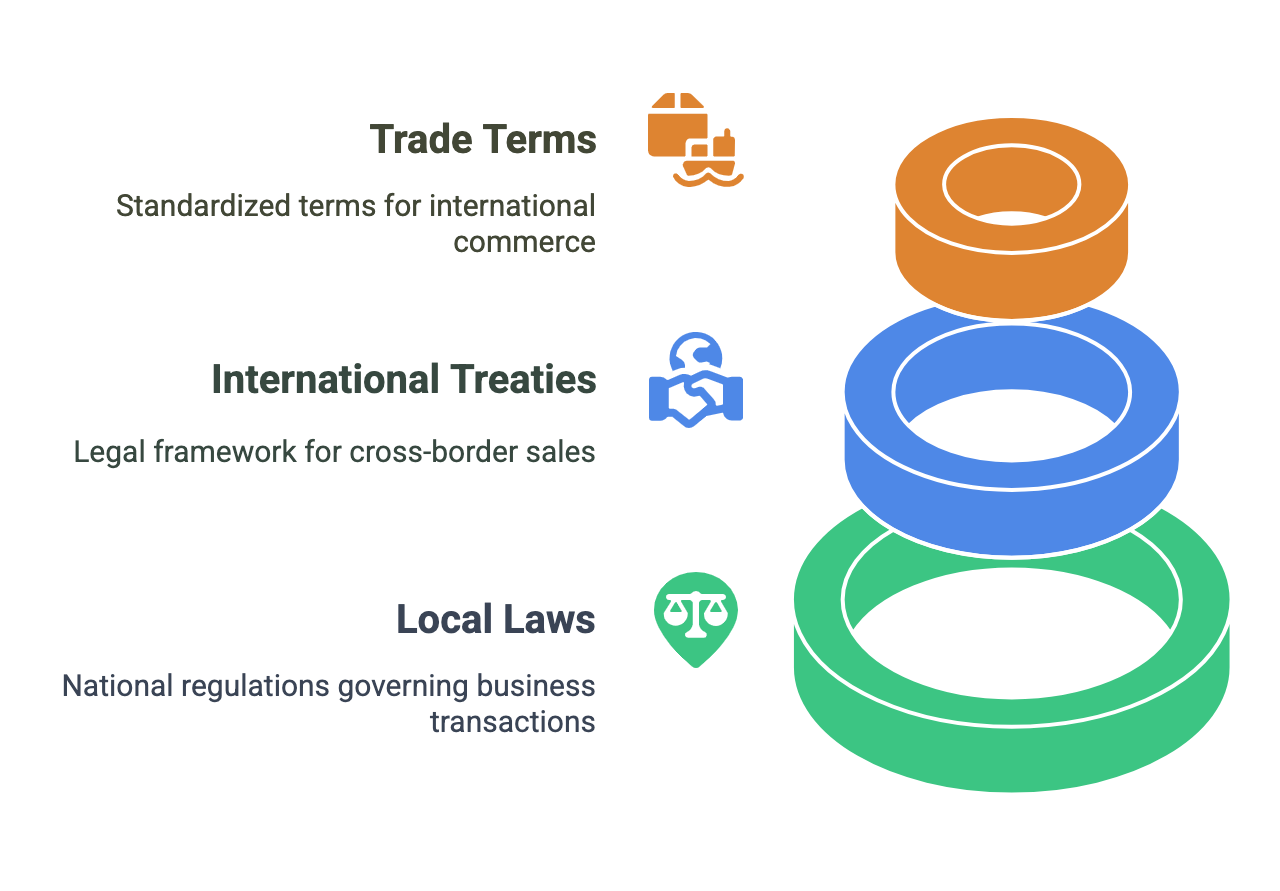
The rules that govern your supplier contract depend on where you and your supplier are based, and whether the transaction is domestic or international. Here are the key legal influences:
- Local commercial laws
These are national regulations that govern business transactions.- UK: Sale of Goods Act – Defines the rights and duties of buyers and sellers in the sale of goods.
- Germany: Handelsgesetzbuch (HGB) – The German Commercial Code, which sets rules for merchants and commercial transactions.
- International treaties
These come into play when supplier relationships cross national borders.- CISG (Contracts for the International Sale of Goods) – A UN treaty that provides a consistent legal framework for cross-border sales, reducing misunderstandings and legal disputes between international partners.
- CISG (Contracts for the International Sale of Goods) – A UN treaty that provides a consistent legal framework for cross-border sales, reducing misunderstandings and legal disputes between international partners.
- Trade terms (Incoterms)
Standardized international terms published by the ICC (International Chamber of Commerce).- Define who is responsible for shipping, insurance, import/export duties, and risk at each stage of delivery.
- Commonly used in global supplier contracts to avoid confusion in logistics and cost-sharing.
Framework Agreement vs. One-Off Contract
- A framework agreement sets up the rules for an ongoing relationship. For example, you might agree to place monthly orders for the next year
- A one-off contract is for a single transaction. These are often used for test runs or specific projects
Cross-Border Considerations
If your supplier is overseas, things get more complex:
- Use Incoterms to clarify who’s responsible for shipping, insurance, and customs
- Agree on jurisdiction: Which country’s laws apply if something goes wrong?
- Don’t forget about language and currency issues
Key Clauses and Contract Components
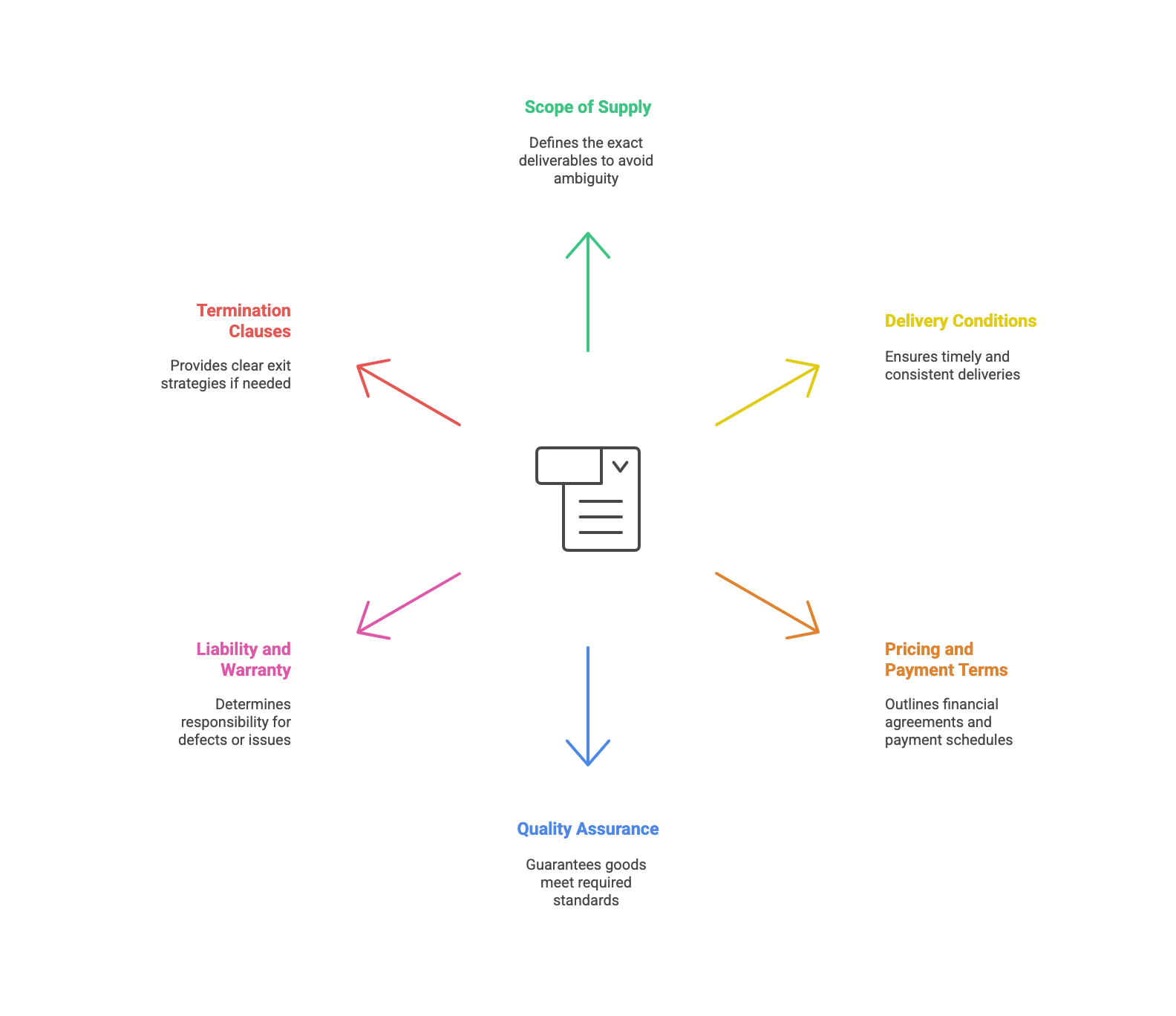
Below are the essential elements every supplier agreement should include, along with what each clause typically covers:
Scope of Supply and Technical Specifications
This clause defines exactly what the supplier is delivering. It removes ambiguity and ensures both sides share the same expectations. Include:
- A detailed description of the goods or services
- Specific quantities, models, or part numbers
- Relevant industry or regulatory standards the products must meet (e.g., CE marking, ISO standards)
Delivery Conditions and Lead Times
Late or inconsistent deliveries can throw off production and planning. This section should clearly state:
- Delivery destinations (e.g., warehouse address, client site)
- Expected lead times, production schedules, or delivery windows
- Incoterms (e.g., FOB, DDP) to define who handles shipping, risk, and customs responsibilities
Pricing, Discounts, and Payment Terms
This part outlines the financial agreement between the parties. Be sure to cover:
- Unit pricing and volume-based discounts (if applicable)
- Payment terms — due dates, early payment incentives, or late payment penalties
- Agreed currency, tax treatment, and invoicing requirements
Quality Assurance and Acceptance
No one wants to pay for subpar goods. This clause defines how quality will be verified and what happens if issues arise:
- The buyer’s right to inspect goods upon delivery
- Clear acceptance criteria (e.g., product tests, documentation checks)
- What happens if the goods are defective — rework, replacement, or rejection procedures
Liability, Warranty, and Defects
This section determines what the supplier is responsible for if something goes wrong:
- The warranty period and what it covers (e.g., repairs, replacements)
- Limits on liability — often a cap on financial damages
- Insurance requirements (e.g., product liability or general commercial coverage)
Termination Clauses and Duration
Every contract should have a clear beginning and end and an exit strategy if needed. This section typically includes:
- The start and end dates of the agreement
- Grounds for early termination (e.g., breach of contract, insolvency, prolonged delivery failures)
- Required notice periods and what happens to outstanding obligations after termination
Common Risks and Mistakes
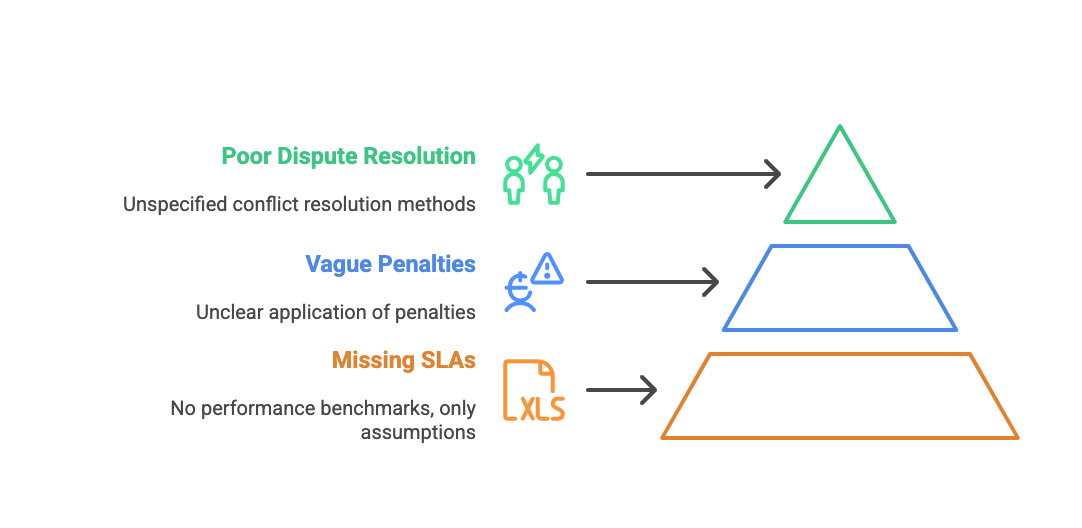
Even the most well-intentioned supplier contracts can fall short if key components are missing or unclear. According to a 2022 study by Deloitte, companies lose an average of 15% of potential value due to poorly managed supplier contracts and ineffective contract terms often because critical risks go unaddressed.
Here are the most frequent pitfalls companies face when drafting supplier agreements:
Missing SLAs and Performance Guarantees
Without Service Level Agreements (SLAs), there's no benchmark for performance — just assumptions. That’s risky.
Why it’s a problem:
- It becomes difficult to measure supplier accountability.
- Minor performance issues can escalate over time without recourse.
What to include:
- Key performance indicators (KPIs), such as:
- On-time delivery rate (e.g., 95% or higher)
- Defect rate (e.g., less than 1%)
- Response time for issue resolution
- Clear consequences for not meeting SLAs
Well-defined SLAs reduce ambiguity and create a performance-driven relationship from day one.
Vague Penalty or Escalation Clauses
Many supplier contracts mention penalties but fail to specify when and how they apply. That’s a recipe for conflict.
Why it’s a problem:
- Ambiguous wording can make penalties unenforceable.
- Escalation processes may be unclear, leading to delays or strained relationships.
What to include:
- Specific thresholds for breaches (e.g., late delivery by more than 3 business days)
- Penalty amounts (e.g., % deductions or credit on future orders)
- Defined escalation path (e.g., from operational to executive level)
Clarity here protects both parties and ensures accountability is more than just a threat on paper.
Poorly Defined Dispute Resolution
When things go wrong, how will disagreements be resolved? Too often, this clause is either missing or vague.
Why it’s a problem:
- Jurisdictional conflicts can drag disputes into the wrong court systems.
- Language and legal misunderstandings can delay outcomes for months.
What to include:
- Dispute resolution method: mediation, arbitration, or litigation
- Jurisdiction and governing law (especially critical in international contracts)
- Language of proceedings, if working across borders
According to the ICC, arbitration cases typically resolve in 12–18 months, whereas unresolved litigation — especially across countries — can extend well beyond 2 years.
How to Draft and Negotiate a Supplier Contract
Custom Clauses To Consider
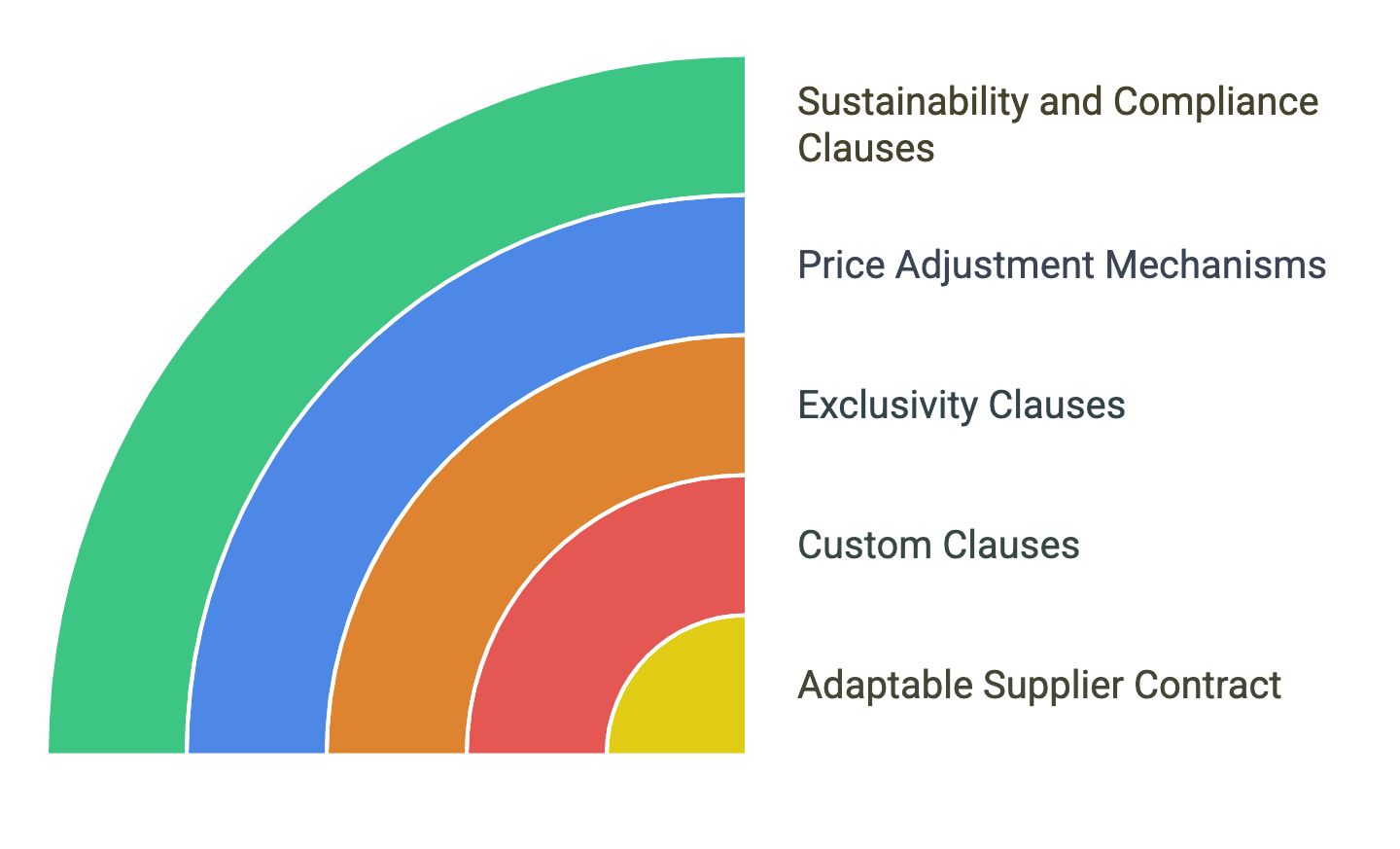
While every supplier contract includes standard terms like price, delivery, and payment, the strongest agreements go further with tailored clauses that reflect your specific operational needs and risk profile. Here are some custom clauses you may want to consider including, depending on your industry and supplier relationship:
- Exclusivity Clauses
Useful when you want to prevent the supplier from working with your direct competitors or ensure priority access to products. For example, in tech or retail, this could mean exclusive rights to distribute a product line within a region. - Forecast Commitments
Particularly relevant for manufacturing or seasonal industries. These clauses set expectations around purchase forecasts — whether they’re binding or indicative — and ensure the supplier plans capacity accordingly. - Minimum Order or Volume Commitments
Helps maintain the supplier’s interest and may lead to better pricing. Conversely, you may want to cap volumes to avoid over-dependence on a single vendor. - Price Adjustment Mechanisms
In long-term contracts, consider including formulas for adjusting prices based on raw material costs, inflation indexes, or currency fluctuations. This avoids constant renegotiation and keeps pricing fair over time. - Force Majeure Clauses (Tailored)
Go beyond generic wording. Define what constitutes force majeure in your industry such as pandemics, port closures, cyberattacks, or regulatory bans. Also clarify what happens: Is performance suspended? Terminated? - Inspection and Audit Rights
Give your company the right to inspect goods at the production facility or audit the supplier’s compliance with agreed standards, especially if regulatory or quality issues are critical. - Change Control Procedures
Define how changes to product specs, delivery schedules, or payment terms will be handled. This avoids misunderstandings if either party needs to adapt. - Sustainability and Compliance Clauses
Especially in today’s ESG-focused environment, clauses related to labor practices, environmental impact, or data privacy may be essential. These are often required by corporate governance or client expectations. - IP and Confidentiality Protections
Important if the supplier has access to proprietary designs, software, or customer information. Make sure confidentiality obligations survive the contract duration. - Termination for Convenience
Allows one party (often the buyer) to exit the agreement without cause, with prior notice. This is especially useful in rapidly changing industries or pilot projects.
These clauses help ensure the contract is not only enforceable but also adaptable enabling smoother collaboration and fewer surprises when business conditions change.
Contract Review Checklist
Before signing a supplier contract, conduct a thorough review to spot gaps and ensure it meets your company’s operational, financial, and legal needs. This also helps align procurement, legal, finance, and logistics teams.
When to Involve Legal Counsel
While templates and internal reviews are useful, not every contract should be handled in-house. Knowing when to bring in legal support can save time, money, and future disputes.
Bring in legal expertise when:
- You're entering high-value or long-term contracts
(especially those tied to core business functions or major capital commitments) - The agreement involves international parties, currencies, or jurisdictions
(local laws, trade rules, and language differences can introduce unseen risks)
You're using a template that needs significant edits or includes unfamiliar terms
(modifying legal language without understanding the implications can backfire)
FAQ – Frequently Asked Questions
Can I Cancel a Supplier Contract Early?
Yes, but it depends on the contract terms. If there is a termination for convenience clause, you can cancel without cause by providing the required notice. Without this, early termination typically requires just cause, such as a material breach by the supplier.
What Happens in Case of Breach?
When a breach occurs, the injured party may have several options depending on the contract, including:
- Terminating the contract
- Claiming damages or compensation
- Enforcing penalty clauses or withholding payments
Always review the contract’s breach and remedies section carefully to understand your rights and obligations.
How Should Delayed Deliveries Be Handled?
Dealing with delays involves:
- Checking the agreed delivery timelines and any penalty or escalation clauses
- Considering force majeure provisions that might excuse delays caused by unforeseen events
- Following any required mitigation steps, such as notifying the other party promptly or seeking alternative arrangements


.svg)




